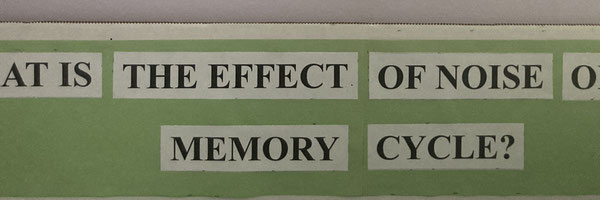What is the Effect of Noise on the Memory Cycle?
Grade 6
Presentation
Hypothesis
Humans can focus better without distractions such as noise which improves their memory cycle.
Research
What is a Memory cycle?
A memory cycle is a process of storing memories and recalling them later. There are two types of memory cycles. There is long term and short term memory. Short-term memory is a way to store information temporarily. It lasts about 15 to 30 seconds. Long-term memory is the storage of information for longer periods. It can last days, months, years, or a lifetime. Repeating and practicing motions or tasks help the brain to store information for a long time.
Different types of memory?
Scientists know that there are different types of memory.
These include motor skill, factual and emotional memory.
Motor skill memory: This type of memory tells people how to do physical things that they have done before.
Factual memory: This type of memory is the storage of facts. It can be short-term or long-term memory.
Emotional memory: This type of memory is the memory of emotions. It is always long-term memory
Variables
Manipulated Variable: The manipulated variable was the frequency the noise was playing at and the memory cycle kept on changing because of the sound waves.
Controlled variable: The controlled variable was the type of cards I was using and the type of noise I was using to conduct the experiment.
Dependent Variable: The responding variable was the time that I was observing.
Procedure
Step 1- Make the memory cards for the experiment.
Step 2- Get the participants to do the experiment.
Step 3- Set up the cards in columns and they must be upside down.
Step 4- Get a stopwatch to test the participant of how long they take, with noise and without noise.
Step 5- Make the stopwatch start and tell the participant to begin.
Step 6- Do this three times with a day's time in between.
Step 7- Record the data on to a computer and print it out.
Observations
I have observed that this experiment does not work on a hard surface because it is hard for the people to flip the memory cards. I then had to switch to a soft surface like a carpet. I have also observed that I need a room that is loud and quiet. As I was doing my experiment I used crowd noise because it is one of the most common sounds. I also observed that humans can focus better without distractions such as noise which improves their memory cycle.
Analysis
I have analyzed that noise has a significant impact on the memory cycle. I also analyzed that certain people who listen to music and are always traveling around the world focus and have a better corresponding memory to music and noise.
Conclusion
In conclusion I have figured out that people who have been living in noise exposure their whole life have changed their frontal lobe. These people took more time to match the cards in no noise than in noise. But some people focused better without noise.
This long term noise exposure can affect a person’s frontal lobe by causing stress and anxiety for the person.
Loud noise can create physical and psychological stress. It reduces productivity, interferes with communication and concentration skills. The most common health problem it causes is Noise Induced Hearing Loss (NIHL).
Exposure to loud noise can also cause high blood pressure, heart disease, sleep disturbances, and stress. These health problems can affect all age groups, especially children.
Application
This question helps people by proving that different people have different learning skills and in the future people can use this to learn better.
Sources Of Error
I would improve it by making all of my data stored in bar graphs because it is easier to see which age group did the test quicker. I would also maybe next time I will make my memory cards better and matching with all the age groups.
Citations
Acknowledgement
I acknowledge that I had some help from my parents.

